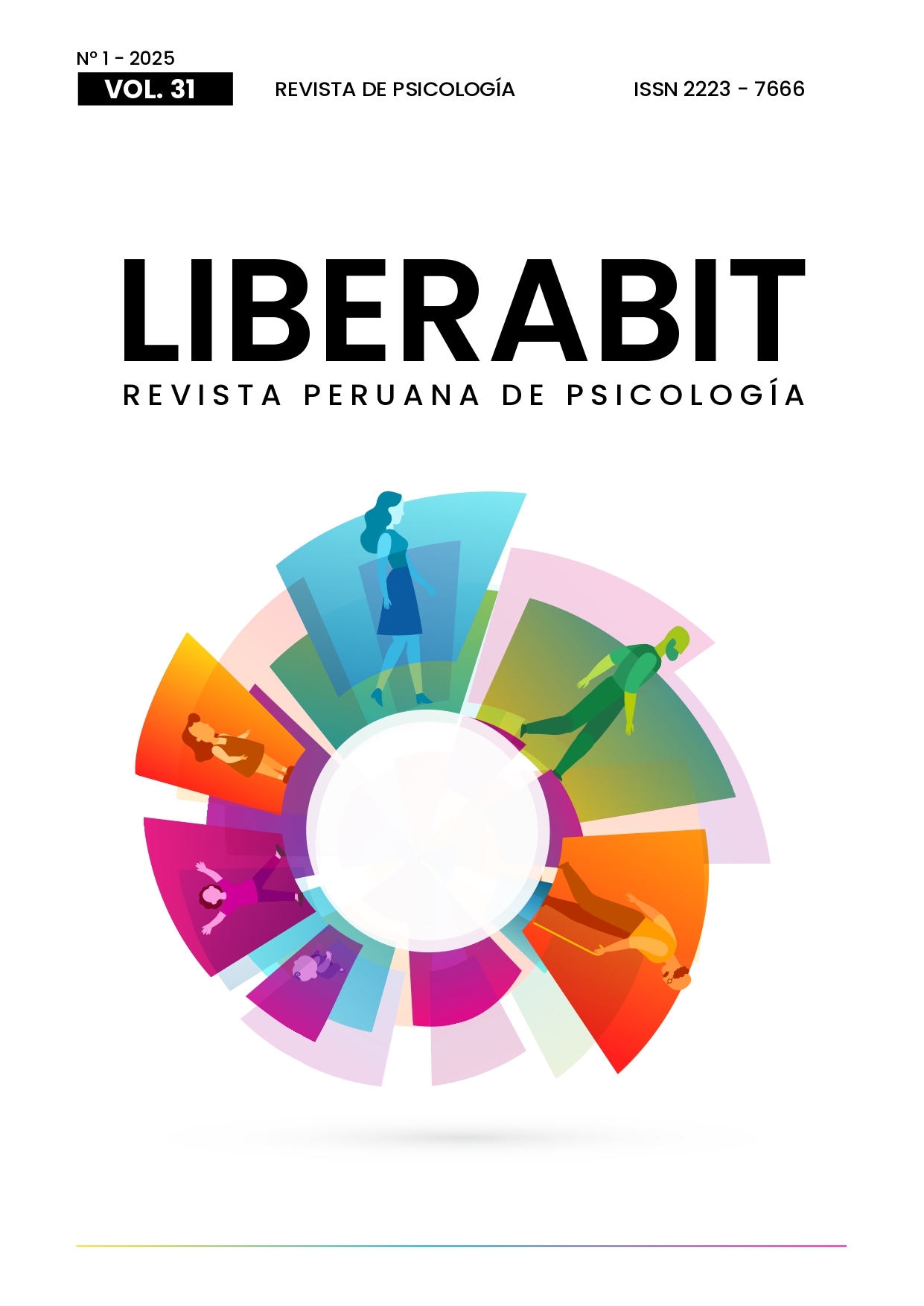Psychometric Properties of the Relationship Satisfaction Scale (SCR) in Emerging Adults
DOI:
https://doi.org/10.24265/Keywords:
satisfaction, CFA, validation, emerging adulthood, psychometricsAbstract
Background: Couple relationships are fundamental in human development, influencing emotional well-being and quality of life. Emerging adulthood (18-29 years) is characterized by the search for identity and the formation of stable affective bonds. Objective: To determine the psychometric properties of the adapted version of the SCR in emerging adults of Ñuble. Method: Quantitative, nonexperimental, cross-sectional and ex post facto exploratory study, with a sample of 212 emerging adults obtained by non-probabilistic convenience sampling. Satisfaction was evaluated with a 4-point Likert scale, measuring the degree of agreement with each statement. Results: The adapted scale showed high content validity (CVI = 1.00) and high internal reliability (α = .90). Confirmatory Factor Analysis (CFA) validated the structure obtained, with adequate fit indices (CFI = .98, TLI = .97, RMSEA = .07), confirming the consistency of the model. Conclusion: Hypothesis H1 is supported, the adapted SCR scale is valid and reliable to assess satisfaction in relationships in emerging adults in Ñuble, in coherence with previous studies.
Downloads
References
Alzugaray, C., & García, F. (2015). Relaciones de pareja y bienestar psicológico. En M. Bilbao, D. Páez, & J. C. Oyanedel (eds.), La felicidad de los chilenos. Estudios sobre bienestar (pp. 237-252). RIL editores. https://www.researchgate.net/publication/294891178_Relaciones_de_pareja_y_bienestar_psicologico
Berscheid, E., & Regan, P. (2016). The Psychology of Interpersonal Relationships. Psychology Press. https://doi.org/10.4324/9781315663074
Bohórquez, M. (2021). Terapia de pareja como fortalecimiento de los valores en la familia: desde el enfoque sistémico. Fundación Universitaria del Área Andina. https://digitk.areandina.edu.co/server/api/core/bitstreams/79cee59b-a445-461a-98fe-9b809c9fdea9/content
Carrillo, B. A., Sánchez, M., & Leenen, I. (2020). El concepto moderno de validez y su uso en educación médica. Investigación en Educación Médica, 9(33), 98-106. https://doi.org/10.22201/facmed.20075057e.2020.33.19216
Cassepp-Borges, V., Gonzales, J. E., Frazier, A., & Ferrer, E. (2023). Love and Relationship Satisfaction as a Function of Romantic Relationship Stages. Trends in Psychology. https://doi.org/10.1007/s43076-023-00333-4
Cepukiene, V. (2019). Does Relationship Satisfaction Always Mean Satisfaction? Development of the Couple Relationship Satisfaction Scale. Journal of Relationships Research, 10(e14). https://doi.org/10.1017/jrr.2019.12
Cisneros-Caicedo, A., Guevara-García, A., Urdánigo-Cedeño, J., & Garcés-Bravo, J. (2022). Técnicas e instrumentos para la recolección de datos que apoyan a la investigación científica en tiempo de pandemia. Dominio de las Ciencias, 8(1), 1165-1185. https://doi.org/10.23857/dc.v8i1.2546
Colegio de Psicólogos de Chile. (2008). Código de ética profesional. https://www.colegiomedico.cl/wp-content/uploads/2019/01/Codigo-de-Etica-Colegio-de-Psicologos.pdf
Collings, T., Lima, Y., Dutaillis, B., & Bourne, M. (2024). Concurrent Validity and Test-Retest Reliability of VALD ForceDecks' Strength, Balance, and Movement Assessment Tests. Journal of Science and Medicine in Sport, 27(8), 572-580. https://doi.org/10.1016/j.jsams.2024.04.014
Cubillos, B. (2021). “En nombre de la ciencia y por el progreso”. Crímenes científicos racistas y la Declaración de Helsinki [informe de licenciatura, Universidad de Chile]. Repositorio institucional. https://repositorio.uchile.cl/bitstream/handle/2250/184231/En-nombre-de-la-ciencia-y-por-el-progreso.pdf?sequence=1
Fauser, B. C. J. M., Adamson, G. D., Boivin, J., Chambers, G. M., De Geyter, C., Dyer, S., Inhorn, M. C., Schmidt, L., Serour, G. I., Tarlatzis, B., Zegers-Hochschild, F., Ashiru, O., Brown, S., Bye, K., Calhaz-Jorge, C., Collura, B., De Sutter, P., Gianaroli, L., Giudice, L., & Taylor, H. (2024). Declining Global Fertility Rates and the Implications for Family Planning and Family Building: An IFFS Consensus Document Based on a Narrative Review of the Literature. Human Reproduction Update, 30(2), 153-173. https://doi.org/10.1093/humupd/dmad028
Epskamp, S. (2022). semPlot: Path Diagrams and Visual Analysis of Various SEM Packages’ Output (Versión 1.1.2) [software de computador]. https://CRAN.R-project.org/package=semPlot
Gambrel, L., Faas, C., Kaestle, C., & Savla, J. (2016). Interpersonal Neurobiology and Couple Relationship Quality: A Longitudinal Model. Contemporary Family Therapy, 38(3), 272-283. https://doi.org/10.1007/s10591-016-9381-y
González-Rivera, J., & Veray-Alicea, J. (2018). Propiedades psicométricas de la Escala de Satisfacción en la Pareja (ESP-10) en una muestra de adultos puertorriqueños. Revista Electrónica de Psicología Iztacala, 21(1), 100-120. https://www.revistas.unam.mx/index.php/repi/article/view/64019
Hair, J. F., Black, W. C., Babin, B. J., & Anderson, R. E. (2010). Multivariate Data Analysis (7.a ed.). Pearson Prentice Hall.
Hernández, M., García, A., Corona, K., Villalpa, H., & Hernández, R. (2024). Diseño y validación de contenido por juicio de expertos de un instrumento para evaluar el impacto del COVID-19 en estudiantes de Educación Superior. Revista Espacios, 45(6). https://doi.org/10.48082/espacios-a24v45n06p06
Hernández-González, O. (2021). Aproximación a los distintos tipos de muestreo no probabilístico que existen. Revista Cubana de Medicina General Integral, 37(3). http://scielo.sld.cu/scielo.php?script=sci_arttext&pid=S0864-21252021000300002&lng=es&tlng=es
Hernández, R., Fernández, C., & Baptista, P. (2014). Metodología de la investigación (6.ª ed.). McGraw Hill España. https://www.digitalrepositorio.com/items/show/2
IBM Corporation. (2020). IBM SPSS Statistics for Windows, Version 27.0. IBM.
Instituto Nacional de la Juventud. (2021). Problemáticas y desafíos de las juventudes en Chile: Evidencias desde las Encuestas Nacionales de Juventud. Gobierno de Chile. https://www.injuv.gob.cl/sites/default/files/injuv2021_problematicas_y_desafios_de_las_juventudes_en_Chile_-1.pdf
Instituto Nacional de la Juventud. (2023). Encuesta nacional de juventudes 2022 (Informe N.° 10). Gobierno de Chile. https://www.injuv.gob.cl/sites/default/files/resultados_regionales_10ma_encuesta_nacional_de_juventudes_2022.pdf
JASP Team. (2024). JASP (Versión 0.18.3) [software de computador]. https://jasp-stats.org/
Krapf, S. (2018). Moving in or Breaking Up? The Role of Distance in the Development of Romantic Relationships. European Journal of Population, 34(3), 313-336. https://doi.org/10.1007/s10680-017-9428-2
Leonard, K., Smith, P., & Homish, G. (2014). Concordant and Discordant Alcohol, Tobacco, and Marijuana Use as Predictors of Marital Dissolution. Psychology of Addictive Behaviors, 28(3), 780-789. https://doi.org/10.1037/a0034053
Congreso Nacional de Chile. (2006, 22 de septiembre). Ley 20.120. Sobre la investigación científica en el ser humano, su genoma, y prohíbe la clonación humana. https://www.bcn.cl/leychile/navegar?idNorma=253478
López-Aguado, M., & Gutiérrez-Provecho, L. (2019). Cómo realizar e interpretar un análisis factorial exploratorio utilizando SPSS. REIRE Revista D'innovació I Recerca en Educació, 12(2). https://doi.org/10.1344/reire2019.12.227057
Mercado, M., & Pino, M. (2021). Epistemología neopositivista en psicología. Alternativas en Psicología, 45, 68-82. Universidad del Bío-Bío.
Nelson, L. (2021). The Theory of Emerging Adulthood 20 Years Later: A Look at where it has Taken us, what we Know Now, and Where we Need to Go. Emerging Adulthood, 9(3), 179-188. https://doi.org/10.1177/2167696820950884
Nina, R. (2013). Amor, estrategias de mantenimiento, comunicación y satisfacción marital: ejes centrales de la calidad marital. Anales de la Sociedad Interamericana de Psicología, 47(1), 1157-1168.
Osorio, R., & Castro, D. (2021). Aproximaciones a una metodología mixta. NovaRUA, 13(22), 65-84.
Portilla-Saavedra, D., Cruz-Riveros, C., Ponce-Correa, F., & Gallardo-Peralta, L. (2022). Estudiar en la universidad y tener hijos e hijas: desafíos de la adultez emergente. Psicoperspectivas, 21(2), 67-78. https://doi.org/10.5027/psicoperspectivas-Vol21-Issue2-fulltext-2295
Rivera, D., Cruz, C., & Muñoz, C. (2011). Satisfacción en las relaciones de pareja en la adultez emergente: el rol del apego, la intimidad y la depresión. Terapia psicológica, 29(1), 77-83. https://dx.doi.org/10.4067/S0718-48082011000100008
Roco-Videla, A., Flores, S., Olguín-Barraza, M., & Maureira-Carsalade, N. (2024). Alpha de Cronbach y su intervalo de confianza. Nutrición Hospitalaria, 41(1), 270-271. https://dx.doi.org/10.20960/nh.04961
Rodríguez, M. (2023). Aspectos teóricos a tener en cuenta en el estudio de la relación de pareja. Alternativas Cubanas en Psicología, 11(31), 9-17. https://acupsi.org/wp-content/uploads/2023/05/Revista-Alternativas-cubanas-en-Psicologia-V11N31.pdf
Revelle, W. (2023). psych: Procedures for Psychological, Psychometric, and Personality Research [software de computadora]. https://cran.r-project.org/package=psych
Soliverez, V., Arias, C., & Pantusa, J. (2018). La relación con la pareja en la mediana edad. Aportes para la comprensión de los cambios desde una perspectiva cualitativa. X Congreso Internacional de Investigación y Práctica Profesional en Psicología, XXV Jornadas de Investigación, XIV Encuentro de Investigadores en Psicología del MERCOSUR. Facultad de Psicología, Universidad de Buenos Aires. https://www.aacademica.org/000-122/261
Sucasaire, J. (2022). Orientaciones para la selección y el cálculo del tamaño de la muestra en investigación (1.ª ed.). https://hdl.handle.net/20.500.12390/3096
Urbano-Contreras, A., Iglesias-García, M. T., & Martínez-Gonzáles, R. A. (2017). Development and Validation of the Satisfaction in Couple Relationship Scale (SCR). Contemporary Family Therapy, 39(1), 54-61. https://doi.org/10.1007/s10591-016-9400-z
Urbano-Contreras, A., Iglesias-García, M. T., & Martínez-Gonzáles, R. A. (2019). Satisfacción general y sexual con la relación de pareja en función del género. Revista Española de Investigaciones Sociológicas, 165, 143-158. https://doi.org/10.5477/cis/reis.165.143
Urbano-Contreras, A., Martínez-Gonzáles, R. A., & Iglesias-García, M. T. (2021). Revisión de la investigación sobre relaciones de pareja en países hispanohablantes (2000-2018). Interdisciplinaria, 38(3), 24-48. https://doi.org/10.16888/interd.2021.38.3.2
Vásquez, K. (2020). Adaptación de la escala de satisfacción en la pareja (ESP-10) en una muestra de universitarios de Lima [tesis de licenciatura, Universidad César Vallejo]. Repositorio institucional UCV. https://hdl.handle.net/20.500.12692/63579
Wagner, M., Mulder, C., Weiß, B., & Krapf, S. (2019). The Transition from Living Apart Together to a Coresidential Partnership. Advances in Life Course Research, 39, 77-86. https://doi.org/10.1016/j.alcr.2018.12.002
Widaman, K., & Helm, J. (2023). Exploratory Factor Analysis and Confirmatory Factor Analysis. In H. Cooper, M. N. Coutanche, L. M. McMullen, A. T. Panter, D. Rindskopf, & K. J. Sher (eds.), APA Handbook of Research Methods in Psychology: Data Analysis and Research Publication (2.a ed., pp. 379-410). American Psychological Association. https://doi.org/10.1037/0000320-017
Zhan, S., Shrestha, S., & Zhong, N. (2022). Satisfacción en las relaciones románticas y phubbing: el papel de la soledad y la empatía. Frontiers in Psychology, 13. https://doi.org/10.3389/fpsyg.2022.967339
Downloads
Published
Issue
Section
License
Copyright (c) 2025 Jorge Prudencio Grave de Peralta, Iván Iturra Hernández, Consuelo Castellón Avilés, Nelson Zicavo Martínez, Mauricio Mercado Aravena

This work is licensed under a Creative Commons Attribution 4.0 International License.
Copyright: In the event that the manuscript is approved for future publication, the authors retain the copyright and assign to the journal the rights to publish, edit, reproduce, distribute, exhibit, and communicate nationally and internationally in the various databases, repositories and portals.
Self-archiving policy: The author can share, disseminate, and publicize his research published by the media (e.g., academic social networks, repositories, and portals) available on the web. During the editorial review process, the journal will provide the author with the previous versions (post-print) which should NOT be disclosed by any media, only for personal use and for final approval. Liberabit will send the author the final version of the article (published version) in PDF and HTML to be shared, disseminated and disclosed by the media available on the web. After the publication of the articles, the authors can make other independent or additional agreements for the non-exclusive dissemination of the version of the article published in this journal (publication in books or institutional repositories), provided that it is indicated with the respective reference that the work has been published for the first time in this journal.











